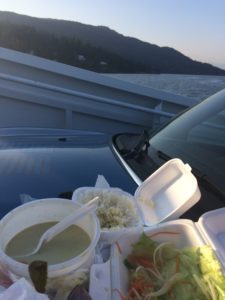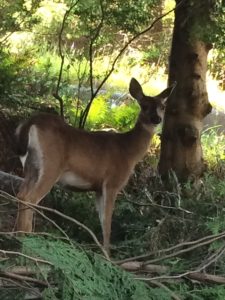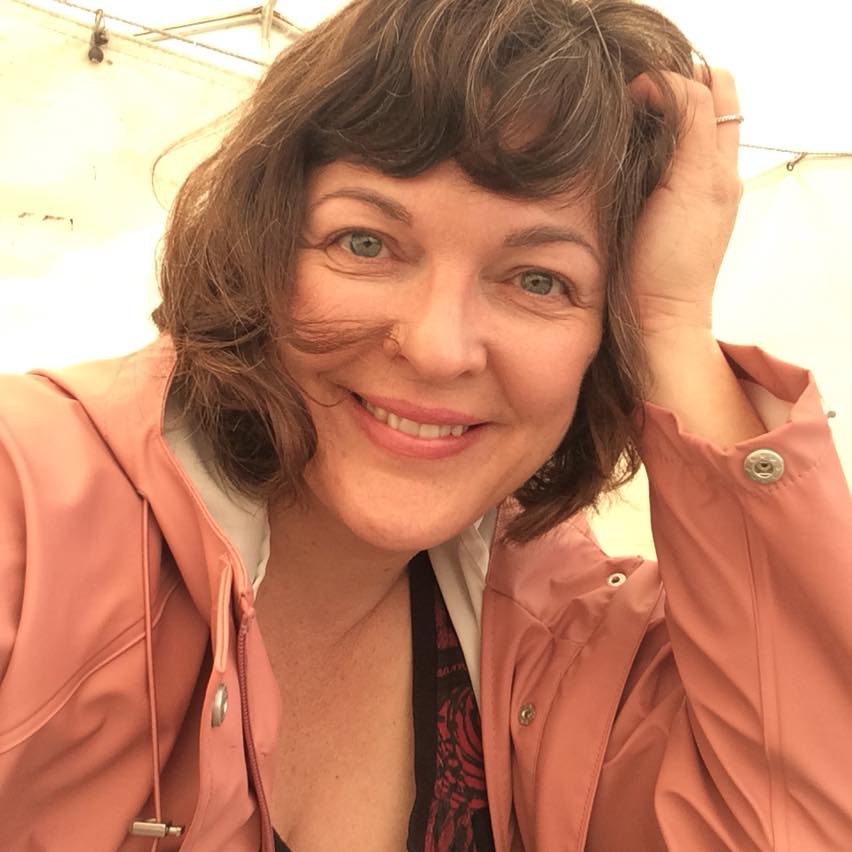Nora and I are standing at a forty-five degree angle eating someone else’s Thai food. I would have never normally chosen green curry octopus but there was a mix up of take-out bags and some lucky person made off with our double Pad Thai and almond chicken. The chewy curved criss-crossed flesh of the octopus reminds me of a bike tire. That said, the flavour is superb. I give Nora all the prawns and salmon chunks in the green curry and I take the octopus and the three large fishy mussels, but my motherly charity only goes so far. We split the scallops (she adorably calls shallots).
The ferriers often put me on the side ramp of the boat because I drive a Mini, hence the steep angle. We were so hungry we decided to eat on the hood of the car, overlooking the ocean, grabbing some cutlery from the ferry cafe upstairs. The other dish we absconded with is a green mango salad: spicy, fresh, perfect summer food. I wonder who ordered this? I wonder if they opened our bags, discovering no octopus and thought with dismay, “Oooh noooo white person’s Thai!”
As I munch, I think of the lunch I had with two two dear friends earlier in the day. One is a Euro mutt like me and the other is Indian. We were discussing the term “settler”. I have to admit I’m embarrassed that I’ve only just heard of this way of describing my heritage and I don’t know how to use it and if I want to and who hopes I do and I do not want to sound like a hipster, so we discuss. One friend is exasperated like me, “What?! What now?! This political correctness goes too far. Why can’t I just call myself a Canadian?! Why get so complicated?! I’m not a settler, I’m a first generation Canadian! My people got here well after all the Euros did the damage.” The other friend, way ahead of the curve, patiently explains in her gorgeous green skirt that we’re all settlers, still, on unceded territories, and it’s a way to acknowledge and show respect for the indigenous people. She adds that her people came over as colonizers way way back. We all mumble, humbled. Okay. I joke, “Settler is a pretty benevolent word. Could be worse. Could be land thief or genocider.”
Yes, this settler jokes when she feels unsettled.
I ponder this luncheon conversation as I pull the last mussel off its beautiful black shiny shell and pop it into my mouth and pretend I like eating it. Why is my first reaction to “settler” a negative one? Well, duh, it’s change. But beyond that, what is up with my feelings? Fear. Fear of what? Fear of being…shamed. For something that I didn’t directly do. A great hatred of anything that creates an “us” and “them” dynamic.
Okay, but there’s more. I step into a worm hole in the landscape of my logic and pop into a land I suppose is tribalism and there is fear in the air. Fear…that my home will be taken from me. That I don’t have a right to be here and I will have to go back, penniless, to Italy or Britain where our people are from and our careers will be over and we’ll very likely live in obscurity and poverty and maybe our children will be taken from us or they’ll die. We will return to all that our ancestors bravely sought to escape. Our country, Canada, the flawed and beautiful experiment that it is, will be dismantled. Word by word. And it won’t be the indigenous people who benefit but corporate USA or China. We’ll all be screwed. Then the environment will be destroyed and we’ll all die. Armageddon. The end.
So interesting to follow the irrational thoughts out to their finish to see them for what they are. Ridiculous. I pop out of the worm hole and back to logic and chuckle as I dig at my coconut rice with an inferior utensil.
Do I want to belong to a country that can’t admit its wrongs and seek the truth and reconciliation required for peace and a healthy future? No. The people I try to support, the people I listen to, read, befriend, are trying to work it out.
Also, how interesting that I fear for my family what has already happened to the indigenous people: land and homes taken away, living in poverty and obscurity, that our children will be taken from us or they’ll die, that our ancestor’s bravery will be in vain, that our nation will be dismantled. Word by word. This realization gives me an audible “wow”. My daughter looks up.
“What?”
“Just thinking of stuff.”
She continues chatting about whether kids her age should shave their legs or not.
I blink and look out across the water as I slurp green curry from a small white plastic spoon we will take home to recycle. I wonder if Orca j35 is still pushing around her dead baby. I wonder if Orca j50 will starve. There are only 75 Salish sea orcas left. The Lummi nation and the NOAA are working together right now to try and feed j50 medicated salmon from tribal fishermen. She’s probably going to die anyway. The whales are starving, lack of salmon. This is a very Westcoast day I’m having.
One side of my family, the Brackney side…originally Welsh…apparently sailed over on the actual May Flower. Who told me this? I think my Mom who heard from a cousin who was scouting around Ancestry.com. They raised fine Arabian horses at some point and the horses were conscripted in 1775: the American revolution. Is that right? The army never properly recompensed the family so they decided they had enough of the USA and immigrated to Canada. Is this true or family folklore? I don’t know. What was their relationship to any indigenous people they encountered? I don’t know. I do know that the propaganda given to Europeans and Britains about immigration suggested that the “natives” were a “vanishing race”, migratory, few and far between, generally peaceful, and that the land was “virgin” and unclaimed. The Aris side came over around 1912 to Alberta. My great grandfather was a Vaudvillian actor who had a five octave range and did a piano routine where half of his face was painted like a woman and he sang soprano to bass. His life in Alberta was as a tinker of bicycles. The Italian side came over after world war one once all the children were born: 1956, I believe. My father said something about a feud with a neighbour where some of my family’s property in Italy was set on fire and they left for safety. I don’t know. This is what I understood. Nora’s grandfather on her Dad’s side escaped Yugoslavia by winning an international rowing contest in Italy and he continued to row past the finish line and escape to his freedom on the Italian banks! All of these histories sound like fantastical fairytales.
“But what about my eyebrows, Mom?”
“Pardon?”
Ooh, I’ve been pretending to listen to Nora while contemplating my history…
“Who ddi I get my eyebrows from?”
“I don’t know. I don’t recognize them from my side or your Dad’s. But they’re magnificent.”
She continues to talk about the intricacies of her friend’s social interactions and how she navigates what she calls “drama”.
We’re about to dock soon. Bowen Island was Squamish hunting ground, apparently, an island so full of deer, the island was called Xwlíl’xhwm, meaning “Fast Drumming Ground”, because of all the little hooves.
We pull into the cove and Nora and I wrap up our Thai feast and wipe our sticky hands.
I think again of my lunch. We decided that the use of settler isn’t all that offensive. It isn’t a hipster term, it’s an acknowledgment of the indigenous people. We can get behind that. Okay. And it doesn’t replace Canadian. It’s about our heritage. So, instead of saying, “I’m Half English, half first generation Italian” I say, “I’m settler Italian, English.” Easy.
I am a settler. I have settled here. I am grateful to be offered the most gracious word possible for my heritage. Settle is a good word. A peaceful word. A homey word. An acknowledging word. This is the best of what my people came to do: settle. Who knows the worst of what my particular family members did? We keep no record of our own wrongs. All I know is: I’m here now. I’m here living in and amongst indigenous friends, colleagues and neighbours who are asking me to hear the truth of the past and to acknowledge it. That is the least I can do. So, please do call me a settler.
The ferry bumps and creaks as it docks. We drive off down the ramp and over the hills to our beloved home among the deer with the taste of someone else’s food in our mouth.



Hi Lucia, Thanks for the mulling on settler status. I struggle with the term in its blunt form. I am first generation Canadian and the only Canadian in my family. Everyone else is in England and always has been. When I say settler, I feel sick. When an indigenous person calls me a settler, I accept that. Why? My relationship to living here is like making the best of things in an airport where one is required to live and work. I gave up on trying to feel settled years ago. Had I known at a younger age what I was enabling, by living and working on unceded territory, I honestly would have left. I want only the opportunity to self-define. I know myself as an unsettled settler.
xxxjenng
the airport – I can see that – thank you for this, Jenn, I accept the term from an indigenous person too, but it is a weird one to self define with. Love to you.